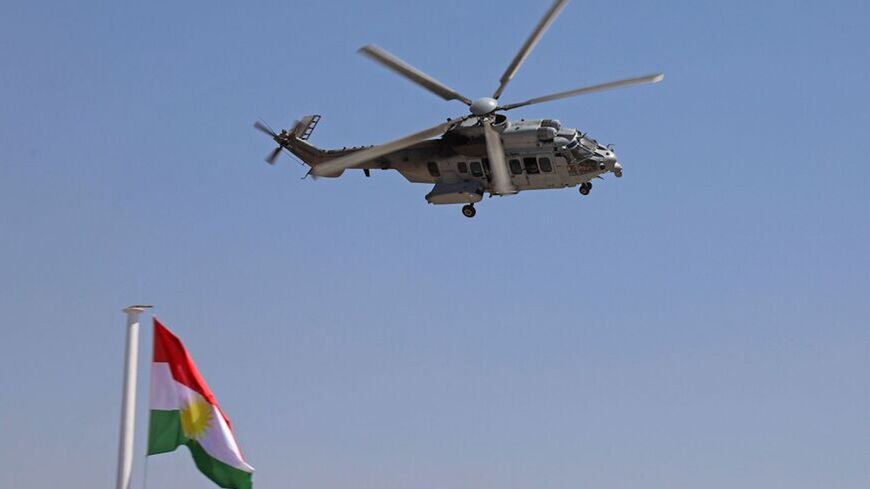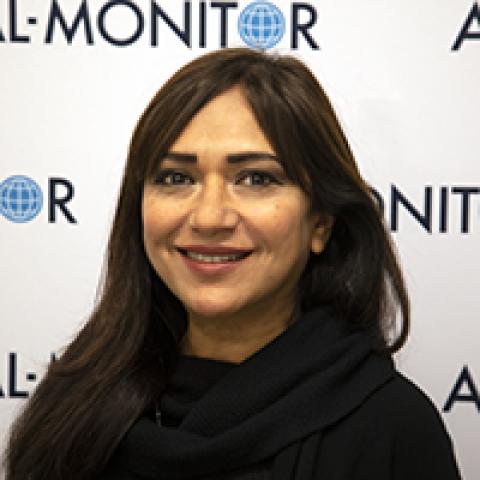A US-backed, Kurdish-led group announced Tuesday that it had recovered the bodies of nine of its fighters who were killed when two helicopters carrying them crashed in Iraqi Kurdistan on March 15. The Syrian Democratic Forces (SDF) stated that the remains of six men and three women members of an elite counterterrorism team were transported to Hasakah in northeast Syria and that a ceremony marking their loss will be held there Wednesday.
The statement shed no further light on who the helicopters belonged to. It reiterated an earlier announcement that the victims were flying to Sulaimaniyah, the second largest city in Iraqi Kurdistan, “as part of joint efforts to combat [Islamic State] cells” when the choppers fell. In a previous statement, the SDF cited poor weather conditions as the reason for the crash that occurred in Dahuk province close to the Turkish border.
Kurdistan Regional Government Prime Minister Masrour Barzani said the helicopters belonged to the Patriotic Union of Kurdistan (PUK), which shares power with Barzani’s Kurdistan Democratic Party (KDP). Tensions between the longtime rivals have resurfaced over the latter’s claim that the PUK ordered the murder of a senior intelligence officer who had defected from the PUK to the KDP after moving to Erbil. Speaking to diplomats and other international officials at a Kurdish New Year reception in Erbil on Saturday, Barzani said, "We’ve started an investigation to find out what these helicopters are and why they were there. These were helicopters that initially were purchased by a group within the PUK, but why they ended up [being operated by] the SDF we don’t know.” KDP officials had initially claimed that the victims belonged to the Kurdistan Workers Party (PKK). The PKK, which has been fighting the Turkish army since 1984, is proscribed as terrorists by Turkey, the United States and the European Union.
In a joint news conference in Ankara, Turkish President Recep Tayyip Erdogan and Iraqi Prime Minister Mohammed Shia al-Sudani made no reference to the incident. However, Erdogan said Turkey expects Iraq to designate the PKK as a terrorist organization and to clear Iraqi lands of their presence.
On Sunday, a PUK spokesperson denied the KDP’s suggestions that the PUK was helping the PKK and that the helicopters belonged to the PUK’s counterterrorism group. KDP officials privately speculate that the PUK has helped establish an air bridge between the SDF and the PKK and that the helicopter crash proves this.
The question of why the helicopters were traveling at night in poor weather conditions has raised even more questions about the mission of those onboard. If they were involved in anti-IS operations, KDP officials ask, then why has the US-led coalition denied any connection to the affair?
US Central Command told Al-Monitor in an email message Tuesday: “There was no US connection with this transport.” It added, “We extend our deepest condolences to the families of Syrian Democratic Force members who were killed in this crash. The SDF is a critical partner in putting pressure on [IS] and in Syria to ensure [IS’] lasting defeat.”
Pentagon press secretary USAF Brig. Gen. Pat Ryder told reporters Tuesday that the US had “no involvement” in the cross-border helicopter flight ferrying SDF officials.
Heartfelt condolences to our #SDF #PartnerForce and the loved ones of the heroes recently killed in a helicopter crash. Their sacrifice and dedication to service for their country won't be forgotten as they continue to maintain safety and stability in #Syria. https://t.co/TISuZDIAGk
— Combined Special Ops Joint Task Force-Levant (@SOJTF_LEVANT) March 18, 2023
One of the victims was SDF commander-in-chief Mazlum Kobane’s nephew Sherwan.
Another source of contention is the number of helicopters involved in the crash. The SDF said there were two. KRG authorities said they knew of only one — a French-manufactured AS350 Eurocopter, which is also popular in Russia, according to parent company Airbus. The model seats up to six passengers with a combined weight of 500 kilograms.
Whether or not he gave the helicopters to the SDF, as alleged by KDP sources, PUK leader Bafel Talabani has made a big show of sympathy for the SDF and its fallen fighters. In a video today to mark the March 21 Kurdish New Year, Newroz, addressed to crowds in the Kurds’ informal capital, Diyarbakir, in southeast Turkey, he called for the release of jailed Kurdish leaders in neighboring countries — a thinly disguised allusion to the PKK’s imprisoned leader, Abdullah Ocalan.
#Breaking: PUK Pres. Bafel Talabani delivered a video message to the Newroz celebrations in #Kurdistan’s Amed in which he urged for unity among Kurds and called for the release of jailed Kurdish leaders in neighboring countries #Esta #TwitterKurds #Newroz2023 pic.twitter.com/kGMBmN3C0i
— Esta (@Esta__English) March 21, 2023
Some speculate that Turkey’s remarkably restrained reaction to the affair — its defense minister denied the helicopter belonged to the Turkish armed forces soon after the crash — indicates that there may be secret peace talks going on with the PKK ahead of the crucial election on May 14.
The Kurds hold the swing vote, and with his poll numbers slipping, Erdogan is desperately in need of a boost.
In a column for the independent Turkish news outlet MedyaScope, academic Arzu Yilmaz noted that Talibani had at a recent forum in Erbil aired his desire to mediate between Turkey and the PKK much as his late father, PUK founder and former Iraqi President Jalal Talabani, had. The United States is keen to see the sides reach an agreement if only to ease Turkish fury over the presence of US forces in northeast Syria in partnership with the SDF. (Turkey says the PKK and the SDF are “the same.”)
“There is nothing incomprehensible about the United States wanting to forge an agreement between Turkey and [the Kurdish-led Administration in North and East Syria] as soon as it can, particularly at a time when Ankara is about to sit down with Damascus and Moscow,” Yilmaz wrote.
Kurdish leaders in Turkey, however, have made clear their intentions to back the opposition. This suggests, in turn, that the government is not in any talks with the PKK, as underlined by Zubeyir Aydar, a senior figure in the Ocalan-led movement, in an exclusive interview with Al-Monitor.
Ahmet Turk, a veteran Kurdish politician who is seen as something of a bellwether for opposition Kurdish sentiments, told Newroz crowds in Diyarbakir today that “no Kurd should vote for or support this government.”
“Yes, finally, we have a bright period ahead of us for the construction of a new world and a new system,” Turk said. Talabani’s embrace of the SDF and Ocalan may have more to do with his own ambitions.
Since his falling out with his cousin and former PUK intelligence czar Lahur, Talabani has sought to establish his street cred by showcasing, among other things, his support for the SDF. Kobane is hugely popular among Kurds across the region.
In December, Talabani met with Kobane in Syria, posting selfies and videos of the encounter.
Whatever his motives, the halo effect certainly doesn’t hurt.
With additional reporting from Jared Szuba.








